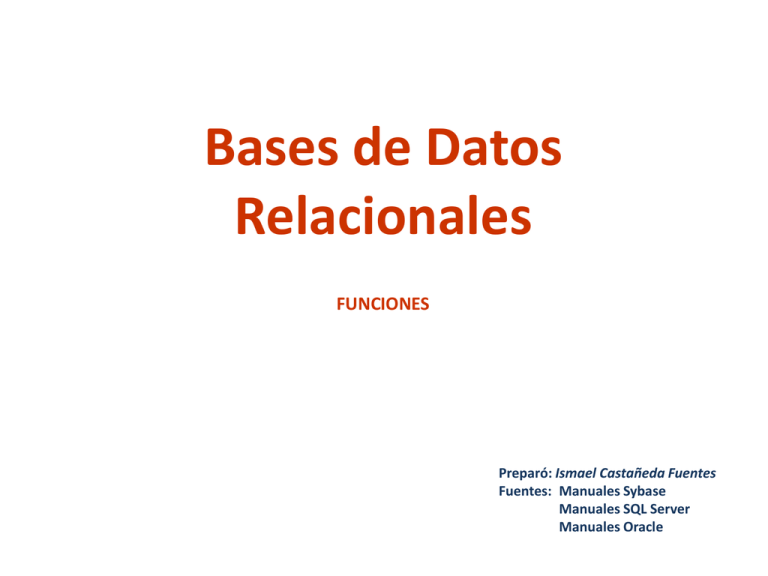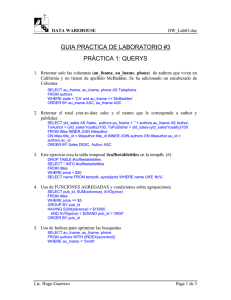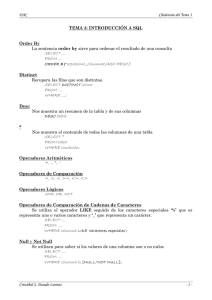funciones
Anuncio

Bases de Datos Relacionales FUNCIONES Preparó: Ismael Castañeda Fuentes Fuentes: Manuales Sybase Manuales SQL Server Manuales Oracle Function (funciones) • Una function es una operación que manipula datos de una determinada manera • Terminología – Argumento – Valor o expresión dada a la function – Resultado – Valor o expresión retornado por la function Uso de funciones • Las funciones se pueden usar en: – Listas de un select – Cláusulas where – En cualquier sitio donde se permita una expresión Uso de funciones en listas de un select • Sintaxis simplificada: select function_name (arguments) • Ejemplo: select distinct upper(type) from titles --------------------------BUSINESS MOD_COOK TRAD_COOK UNDECIDED PSYCHOLOGY POPULAR_COMP Uso de funciones en una cláusula where • Sintaxis simplificada: select column_list from table_name where condition_with_one_or_more_functions • Ejemplo: select title from titles where lower(title) like "%the%" title ----The Gourmet Microwave The Psychology of Computer Cooking (2 rows affected) Conversión de datatypes • Bajo mucha circunstancias, los servidores pueden comparar dos valores de diferentes datatypes • Conversión implícita – La que hace automáticamente el servidor • Conversion explícita – Conversion que requiere de la function convert • Conversion no soportada – Conversion que no puede realizar el servidor Función convert • La función convert cambia valores de un datatype a otro • Sintaxis simplificada: convert (datatype, expression [, style ] ) • Ejemplo_1 Se convierte money a char(10): select price from titles where convert (char(10), price) like "%.99“ • Ejemplo_2 – Verificar la base de datos en que se trabaja: select db_name() – Escribir esta consulta usando “+” (requiere operandos tipo string. La consulta fallará: select "The price of "+ title + " is $" + price from pubs2..titles – ¿Por qué falla la consulta? – Reescribir la sentencia usando convert: select "The price of "+ title + "is $" + convert(varchar(10),price) from pubs2..titles Categorías de funciones • • • • Date Mathematical String Aggregate Funciones date • Las funciones Date son extensiones SQL que manipulan datos tipo datetime • Ejemplos – Función getdate select getdate() -------------------Feb 4 1999 12:00 AM – Función datename select datename(mm, pubdate) from titles where title = "Net Etiquette" -------------------July – Función dateadd select dateadd(dd, 5, pubdate) from titles where title = "Net Etiquette" -------------------Jul 29 1991 12:00 A Funciones matemáticas • Las funciones matemáticas son extensiones SQL que manipulan datos numéricos • Ejemplos – Función round select round(price, 0) from titles where title_id = "PC1035" -----------------23.00 – Función floor select floor(3.14159) -----------------3 – Función sqrt (raíz cuadrada) select sqrt(122) -----------------11.045361017187261 Funciones string • Las funciones de string son extensiones SQL que manipulan datos de caracteres • Ejemplos – Función substring : select substring("(510) 922-4087",7,8) -------------------922-4087 – Función right : select right("Mr. Ringer", 6) --------------------------Ringer – Función lower : select au_lname, au_fname from authors where lower(au_lname) like ("de%") au_lname au_fname -------------------------------------DeFrance Michael del Castillo Innes Operador + • Funcionalmente similar a una función de string • Concatena dos o más strings de caracteres • Ejemplo_1: select "Mr. " + "Harry Sullivan" ------------------------Mr. Harry Sullivan • Ejemplo_2: select au_id, au_lname + ", " + au_fname as "name“ au_id -----------------172-32-1176 213-46-8915 238-95-7766 ... name -----------------White, Johnson Green, Marjorie Carson, Cheryl from authors Funciones aggregate • Las funciones Aggregate son estándares ANSI que ejecutan operaciones matemáticas con valores de las columnas • Excepto count(*), las funciones aggregate ignoran los NULLs • No se pueden usar en una cláusula where, excepto si hace parte de un subquery select title_id, price from titles where price > (select avg(price) from titles) • función count(*) select count(*) from titles where type = "popular_comp" ------------3 • función count(column_name) select count(price) from titles where type = "popular_comp" ------------2 • función avg select avg(price) from titles where type = "popular_comp" ------------21.48 Función isnull • La función isnull reemplaza valores tipo NULL en un determinado valor no NULL • Sintaxis: isnull (column_which_may_have_NULL_values, non-NULL value) • Ejemplo: select avg(price) from titles ----------14.77 select avg(isnull (price, $0.00)) from titles ----------13.13



